
Guide to Mega Open House Blitzes
An ideal mega open house blitz looks something like this
Over the course of a weekend, nearly 500 broker listings are held open — including one that boasts more than 100 attendees. Thousands of directional signs are staked across your market area. Facebook ads targeting a local audience garner tens of thousands of impressions. Eager agents fire up Instagram to show off the food truck they rented for the occasion.
And after the city-wide events conclude, data streams in. It shows that most attendees are serious, early-stage buyers in need of an agent. 12% of them indicate they’d like pre-approval help. The contact information captured at each open house is auto-synced to agent CRMs and agents begin their automated and one-on-one follow-up plans. The agent or broker can also leverage the contact information of each open house attendee to generate smart retargeting campaigns that promote the brokerage or specific listings. The ultimate goal is to keep the listing and listing agent top of mind in the days following the open house.
Sound like your real estate fantasy? Nope, it’s just a really successful “mega open house blitz.” These are just some of the results we’ve heard from clients whose brokerages or brands host large-scale open house events.
Getting there requires a lot of coordination and communication. But when there’s a smart strategy driving these events, it’s possible to achieve high agent participation, complete client satisfaction, an increase in motivated buyer-side leads and higher brand recognition across your market. In short, open houses — yes, open houses — can give you lift across nearly all facets of your business.
So, how do you execute a pitch-perfect mega open house blitz?
Let’s dive right in.
Chapter 1
What is a mega open house blitz?
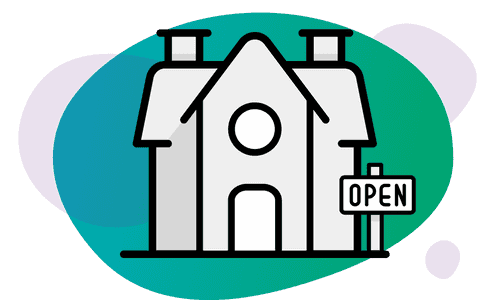
A mega open house blitz is a coordinated open house event, where dozens (or even hundreds) of agents hold their listings open during the same time frame. Typically, the brokerage’s marketing department plans and executes the event with the help of office staff. Whether the event is hosted by one office, a boutique brokerage or a local franchise for a larger brand, the goal of the open house event remains the same — to increase buyer lead generation for agents and as a result, for the broker.
Mega open house blitzes operate on economy of scale. While they require upfront work from the broker or brand, a coordinated open house event can help agents organize and promote their events more effectively. The result is a cross-town event that benefits buyers, sellers, agents and the brands they represent.
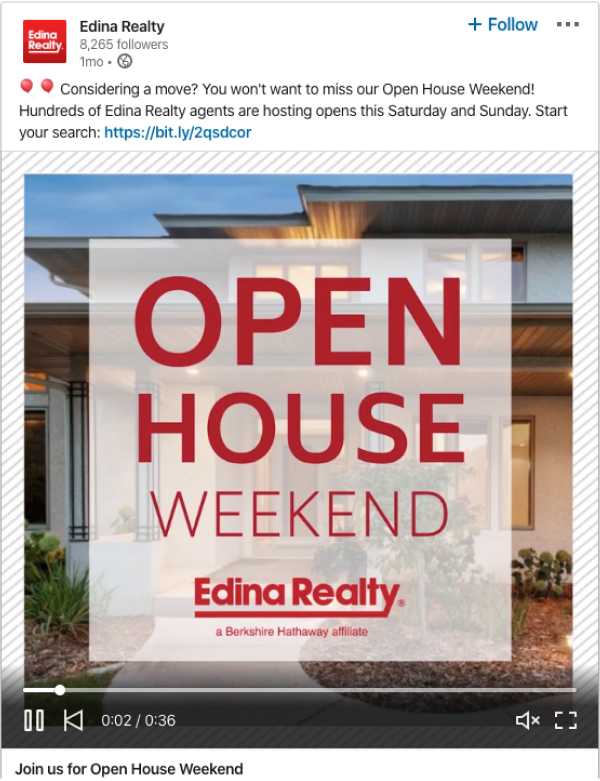
How consumers benefit from an open house blitz
According to the National Association of REALTORS®, 90% of homebuyers1 say that open houses are a valuable source of information. When offered an easy-to-plan open house tour experience, buyers can get a quick and more complete view of the current market and how they fit into it.
Additionally, most buyers report that while the home shopping experience is exciting, it can also be quite time-consuming. Open house blitzes allow early-stage buyers to better optimize their time. Rather than waiting outside listings for a private showing to begin, buyers can zig and zag to a series of homes, spending as little or as much time as they want in each property. At the end of their blitz tour, buyers can narrow down their options and make a short list of homes they wish to visit again in the future.
On the seller side, the benefits are pretty obvious. By taking part in a large-scale open house event, a listing is more likely to generate online and in-person traffic. This can be equally important for recently-listed homes and homes that have been lagging on the market.
For brand-new listings, a mega open house event generates buyer traffic early on, which may help the seller get fast offers or additional private showing requests. These events can also help houses that have been on the market for longer. By hosting a heavily-promoted open house for an older listing, the listing agent can show the seller that the property remains a priority. These open houses can also draw in buyers who may not otherwise look at a listing that’s been stigmatized by a long-time market status.
How brands and brokers benefit from a mega open house blitz
For brands and brokers, these large-scale open house events boost external brand recognition and internal brand loyalty among agents.
Between online ads, Facebook events and a flurry of directional signs all across town, these events offer heightened brand awareness across the local market. They can also motivate buyers to view more broker-listed properties, as many plan to spend an entire afternoon visiting local open houses.
Brands often find that agents are more likely to participate in the coordinated open house events, especially if their office or franchise provides marketing support or other turnkey technology tools. By reviewing post-event metrics, brokers can easily track agent and office participation, as well as overall foot traffic.
How participating agents benefit from a mega open house blitz
Agents benefit from an immediate boost in exposure and foot traffic for their listings, as city-wide open house blitzes tend to draw in more attendees than singular events. Additionally, both rookie and veteran agents can find advantages in the mega open house blitz model.
Long-term agents who prefer to focus on listings — or who may have more than one listing to support — can ask newer agents to host an open house on their behalf. Less seasoned agents benefit from the robust event promotions and they are typically allowed to “claim” the buyer leads generated throughout the event. Being given the opportunity to meet early-stage buyers can be extremely advantageous for rookie agents, as NAR data shows that 75% of buyers work with the first agent they interview.
The conversion question: Can open house blitzes lead to more immediate business?
Open house attendees can be a critical source of business for agents who methodically follow up with early-stage buyers quickly after the event. But data shows most agents don’t factor these leads into their business plans.
According to the NAR, just 5% of buyers say they met their agent at an open house, but our data shows that 71% of open house attendees checking in via Spacio are unaffiliated. The gap is astounding, but it also indicates a big business opportunity for agents, brokers and brands.
By investing in a coordinated open house approach, brands can empower agents to make meaningful contact with eager, early-stage buyers who are (often) still looking for an agent.
Ready to rev up your open house ROI? See how top agents drive in leads and business by focusing on four promising groups of open house attendees.

Chapter 2
Planning a successful mega open house blitz
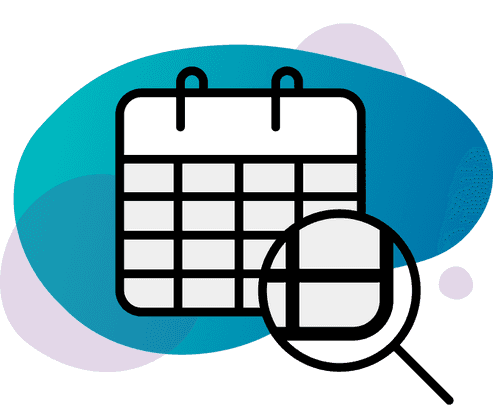
First things first: Who’s in charge? These open house events can require a lot of coordination, but you also don’t want too many cooks in the kitchen. Consider forming a small committee that represents stakeholders across the brand, including:
- Executives
- Marketing and IT Staff
- Sales managers or brokers
- Office administrative staff
- High-performing agent(s)
- Rookie agent(s)
How to determine the best time of year for your open house events
From there, the next step is to schedule a full year of open house blitz dates so that all stakeholders — agents and their support staff, corporate employees and vendors — can prepare accordingly.
When is the best time of year for these events? It really depends on your market and typical market cycle. Many brands kick off the spring with a mega open house blitz in February; they may run 1-2 open house blitzes per month through the end of their busy season in the fall.
Of course, your market may behave a little differently, so consider inventory and monthly sales volume when determining your schedule.
Right now, we are running mega open houses in March, April, May, June and then in September and October. So we host six per year, focusing on the spring and fall because that’s when our listings typically see the most foot traffic.
We have one open house celebration weekend a month, year-round. In the past we ran them every first weekend of the month, but we’ve run into times where that overlapped with a major [Kansas City] Chiefs game. So of course that affects attendance. We’re now a little more flexible on the weekend we choose each month, because we want to be cognizant of what's going on in the market.
Scheduling the dates in advance isn’t only helpful for those involved in planning the event logistics. When agents have the events on their radar, they can also use them as leverage in their listing presentations with potential sellers.
Should brands hold all their open houses at the exact same time?
There are no hard-and-fast rules that dictate ideal timing for a mega open house blitz, though most companies choose to host them on weekends. Some brokers set a strict time range so that participants can plan a concurrent tour of listings around town; others allow their agents to schedule opens across a few days.
During our open house weekend events, we promote all open houses hosted between Thursday and Sunday of that week. Some agents choose to host twilight open houses on Thursday evenings, or they may host one on a Friday afternoon so buyers can visit on their way home from work. We keep it flexible, so agents and their clients can pick the times and formats that work best for them.
Our MEGA open house events are on Sunday afternoons. Our MEGA marketing promotion advertises the events using Zillow Ads, HomeSpotter Boost social & digital ads, WAZE ads, digital billboards and lots of local neighborhood advertising for our 400+ listings that will be held open. Visitors can easily use Waze to map out their visits the day of the event.
Start planning your open house promotions early
Meet with the committee early in the year to determine what marketing support the larger brand will provide for the mega open house blitzes.
Common company-run marketing efforts can include
- Social media ads on Facebook, Instagram and Nextdoor
- Banner ads on popular websites
- Digital and traditional billboards
- Online or print newspaper ads
- Branded emails to send from company CRM
- Press releases and customized press pitches
- One landing page or Facebook event advertising all participating open houses
And if you’ll be running online or social media campaigns for your open houses, don’t forget that you need to build a conversion funnel for consumers who click through. Start designing and coding your open house landing page template well before your first event.
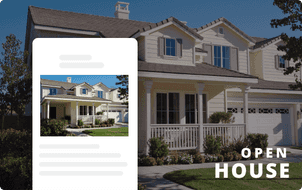
Once you’ve finalized your list of approved marketing channels and tactics, use a project management system to organize tasks and deadlines. Be sure that corporate employees — designers, social media specialists and IT professionals — understand that these events are time-sensitive, so there is no leeway on the timing of deliverables.
How to coordinate with open house vendors
Next, you’ll meet with the vendors who will support your brand during each mega open house blitz.
- Printers and signageIf you have approved print or sign vendors, get advance deadlines for each event and add them to your internal communications plan. If your agents are in charge of their own print materials and directional signage, ask the vendor if they would provide a discount code for each blitz weekend.
- Billboard vendors and newspaper adsIn the case of both billboards and newspapers, you’ll want to secure contracts early in the year to ensure that you receive the best placements. Ask for their deadlines upfront so you can add it to the project plan.
- Third-party digital ad vendors
If you’ll be using a marketing company to run ads on popular social media channels or websites, check in with them at the beginning of the year to see what they may need from you. To minimize your own effort, ask if they have the technology to run automated ads that pull directly from your MLS data. Some products, like Boost, are able to automatically run ads for all company listings with upcoming open houses.
In the absence of an automated ad vendor, be sure that you allow for plenty of time to manually place open house ads. (Check out our guide to manually placing open house ads on Facebook.)
- Open house software
Many agents still use a printed sign-in sheet when they host open houses, and we believe that’s one reason that open house lead conversions are so low. If you’re going through the trouble of coordinating a mega open house blitz, you may want to equip your agents with software that collects the contact information of attendees and follows up automatically after the events conclude.
If it’s not in the budget to pay for an open house software for each agent, form a partnership with one approved vendor. Communicate the partnership as part of your internal communications plan.
Once you have your open house software set up, take special consideration to customize the fields that you require when attendees sign in. In the short-term, the contact information can be leveraged for lead generation. Over time, these sign-ins will provide data and insights that can guide corporate initiatives
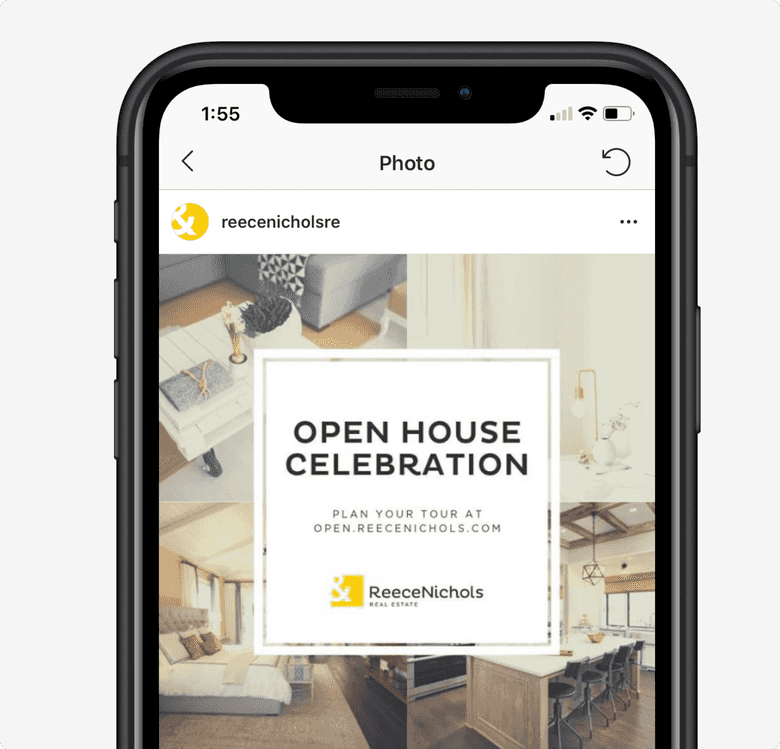
Using incentives to increase agent participation and foot traffic
According to the brokers and brands we spoke to, the key to improving agent participation and open house foot traffic is to offer incentives that benefit agents and buyers alike.
One idea is to offer a sweepstakes-style prize for an attendee who signs in at a participating open house. We’ve heard of brands who offer iPads or Apple watches, while BHHS Georgia Properties opts for a prize package directly related to homeownership.
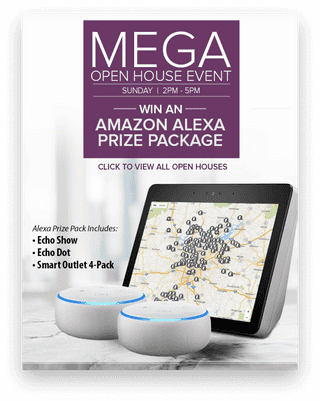
For each MEGA open house event, we give away an Alexa Prize Pack to a visitor who signs in via Spacio. We use the product visuals in our event promotions, so the buyer sees that they could receive an Echo Show, 2 Echo Dots and a 4-pack of cool smart outlets. It’s a nice package and it helps our agents to more easily capture the contact info of potential buyers attending the events.
Other brands, like BHHS New England Properties, motivate agent participation through company-paid promotions. In 2019, the company began using Boost to run automated Facebook ads promoting each participating open house.
Our company-paid digital ad open house campaigns through Boost by Homespotter are working tremendously. Not only do our agents love that they can promise and show a live Facebook ad to their sellers, we are also benefiting from increased attendance at our events and seeing immediate results.
Remember, it’s only an incentive if the recipient fully understands the benefit. So if you do place digital ads on behalf of your agents, be sure to clearly communicate what the ad will look like and how it will function.
Technology companies like HomeSpotter can send each agent a live version of their ad for approval and even program the ad to target the home’s seller directly. If you place the ads manually, send a (static) example ad to your agents so they know what the promotion will look like.
Finalizing your internal communications plan
As any corporate or brokerage representative knows, it can be challenging to communicate deadline-based information to a group of extremely busy agents. But to ensure each mega open house blitz is successful, you’ll need to ensure that agents understand the basics of the event and the resources you have available to help them.
Most brokers and brands say that they use a variety of communications methods to get the word out about the events, including e-cards, calendar invites, weekly sales meetings, in-office posters and printed best practices.
No matter what channels you use, be sure not to overload your agents and administrative staff all at once. Follow this six-week plan to ensure they have all the information they need at the right time.
- Four weeks beforeRemind agents and support staff of the mega open house blitz date(s) and encourage them to begin using the event as leverage in upcoming listing presentations. If not already complete, add the event to all company calendars and invite agents and support staff.
- Three weeks beforeEncourage agents to order directional signs for their upcoming open houses.
- Two weeks beforeSend a list of open house best practices, including sign-in scripts, flyer and postcard templates, local signage guidelines (if available) and food and drink ideas. In your sales meeting, have agents trade scripts that can encourage attendees to sign in.
Scripts to encourage open house sign-ins - One week beforeEncourage agents to test out their open house software so they can set it up easily at the event. If you’re having an in-person sales meeting, tell your agents to bring their tablets and show them how to sign into Spacio (or your preferred technology). Then, have them approve an automated attendee follow-up email.
- Week of the eventSend one communication, if possible, noting these important details:
- The deadline for when agents must mark their open houses in your MLS. (We recommend by Tuesday.)
- Remind them of all the company-sponsored promotions supporting the blitz, including any social media or online ads for individual open houses
- Remind agents to pick up last-minute signage, finalize any print marketing materials and to distribute flyers or postcards to the neighborhood
- Offer new visuals for agents and offices to use on their social media channels, including a Facebook cover photo or a square post for Instagram.
- One week after the eventCelebrate! Review your open house software data to determine which agent had the highest foot traffic, and reward them with a small gift at your weekly sales meeting. You can also ask agents (on the honors system) to submit the number of promising leads they’ve followed up with in the days following the event.
This may seem like a lot of work, but once your agents see the value of these open house blitz events, the preparation and execution will run a lot more smoothly.
We've been doing [open house celebrations] for awhile, so our agents are very familiar with them. It doesn't take a lot of internal communications work anymore. In our weekly sales meetings, we just remind agents to mark their open houses so they can get the company-paid promotion for their event.
Chapter 3
How to finalize all the marketing for your open house blitz
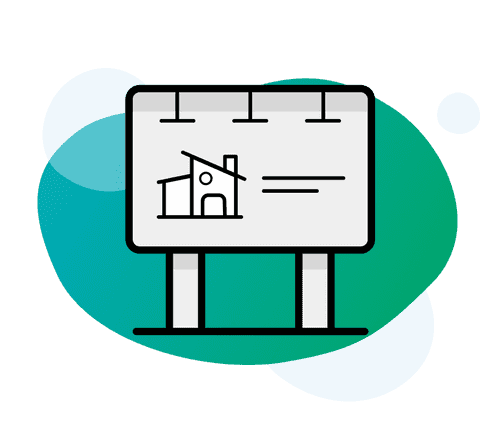
In the weeks leading up to your mega open house blitz, you'll want to finalize the promotions that were greenlit by the steering committee earlier in the year.
Be sure that
- Digital and print billboard creative has been approved and placed
- Online or print newspaper ads are submitted on time
- Automated emails advertising the open house have been scheduled in your company CRM
- Press releases are drafted
- Open house landing pages (if applicable) are set up
Many brands also run social media ads promoting individual open houses on behalf of their agents. Whether you use a third-party vendor or complete the process in-house, you’ll want to start early in the week to ensure the campaign runs smoothly.
Confirm social media ads with your marketing vendor
If your company is paying for third-party social media ads for each participating agent, be sure to ask your vendor exactly what they need from you.
If you're using Boost by HomeSpotter, you’ll give us the promotion dates for your open house blitz, and we’ll turn on ads for all broker-listed properties showing open houses during that time frame. Ads can run on Facebook, Instagram and across the web. We pull data directly from your MLS, so you’ll feel comfortable that they’re accurate and up-to-date.
HomeSpotter will also send an alert email to each participating agent. Agents can view their exact ad and make edits if needed.
Note: If your vendor doesn’t have MLS integration, you’ll want to be in close communication to ensure that you provide them with the exact data they need for each promoted open house. Ask how much advance time they need to manually place the ads and ensure that your agents mark their open houses well in advance of that deadline.
How to manually set up Facebook open house ads for your brand
Even if you don't have a vendor who will place ads on your behalf, we strongly recommend that you consider promoting each of your broker-listed open houses on Facebook. Facebook counts real estate as one of its top ad categories — and they support these ads accordingly.
Without the help of an automated ads vendor, you’ll have to manually build individual ads for each open house you wish to promote. This is a tedious process, and we recommend that you do a mini test run in the weeks leading up to your first blitz to ensure it goes smoothly.
Here’s how one brokerage, ReeceNichols, describes their manual process:
First, agents submit their listings through a data feed on our website. Then we export the Excel file of that data and we clean the file up so that it only includes the fields needed for our open house ads — things like the description, the price, relevant MLS data, and pictures of each property. From there, we use Facebook Business Manager to set up the campaigns, which includes setting a budget and the targeting parameters for each ad.
Not sure how to build and place these manual ads? We wrote up a quick primer for you.

Why should I consider automated ads for my mega open house blitz?
A primary reason to outsource this task to a vendor with automation capability is that it will save your team a lot of time and headaches. Large-scale ad campaigns for open house events simply work better when they can pull from a dynamic feed, rather than a static .csv Catalog.
Here are some additional benefits to running automated ads
- Ads pull in live, accurate data from your MLS feed, including price, image and listing descriptions
- If an agent adds an open house later than the designated deadline — say, two or three days before your blitz event — a campaign would still be generated on their behalf
- If an agent cancels their open house the day before your blitz, the ad would stop running
- Agents can be given the opportunity to view and tweak their ad before it goes live; ads will auto-publish even if they aren’t reviewed by the agent
- You can set up micro-targeting parameters so that the home seller is targeted by their own open house ad on Facebook
If you set up and run manual ads, be sure you know how to check your Facebook ad stats for each campaign. That way, you can assure agents that their promotion was run, even if they didn’t see it themselves.
We sometimes get complaints from agents that say, ‘I don't think my ad ran because I never saw it.’ We make sure to track everything we do. So we always have those metrics to show, yes, here's what it looked like and here's how many hits it got.
Chapter 4
How to empower your agents to succeed at their open houses
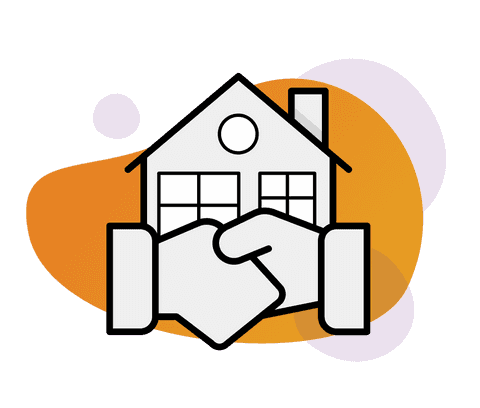
Company-run promotions are great for getting the word out about the events, and for boosting attendance each month. But the key to building a long-term, successful open house strategy for your brand is to empower your agents to take the events seriously as both a means for generating potential buyer leads and satisfying existing seller clients.
Here are ideas and resources you can offer your agents, to ensure they are all-in any time you host a mega open house blitz.
Ideas to help agents drive traffic to their open house events
In your next sales meeting, poll your agents on the best open house promotions they’ve ever run — and then ask why you think they were so successful.
Get them talking about their favorite ways to drive foot traffic, including
- Directional signs that lead from busy roads to individual listings
- Promising food and drink, including new options like food trucks or pop-ups
- Kid-friendly features like a bouncy house, a magician or a kids’ band
- Adult-friendly events that include wine or cheese tasting
- An all-day grill-out, complete with a pig roast and a contest for the best BBQ sauce
Remind agents that they don’t have to spend exorbitant amounts of money in order to boost enthusiasm and attendance. Focus first on making the event unique and memorable.
And remember, if you can’t afford to host a blow-out event, consider bringing in local sponsors to co-host. Local restaurants, coffee shops and bakeries are often excited to pair up and extend their reach beyond their typical client base. You can also reach out to your title and lending partners, but be sure to follow RESPA guidelines to the letter.
Resources to help your agents follow up with open house leads
You’ll also want to reinforce to your agents the importance of following up with buyer attendees who indicate they are not yet affiliated with an agent.
While it will be up to each individual agent to map out their outreach plan, brokers and brands can give them the tools they need to succeed.
Consider
- Offering follow-up scripts for buyers who gave their contact information
- Sending automated emails to anyone who signs into your open house software
- Promoting an agent-branded search app to attendees
- Crafting personalized email templates that agents can send to gauge interest after the event
Not sure where to start? Share this six-week outreach plan with your agents.
Chapter 5
How to set goals and measure your ROI
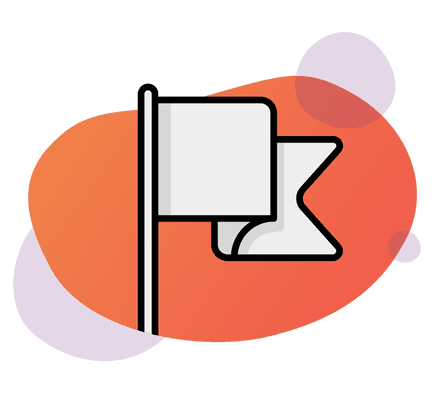
Often, when we talk about goals and ROI, we focus on the numbers. And as a company that works with a lot of data, we can attest: The numbers are important — and they don’t lie.
But after speaking with some of our clients, we found that they tend to measure success by both quantitative metrics and qualitative outcomes. Here, we’ll show you how to do the same.
How do I set challenging, but meaningful open house goals for my brand?
Start by looking at the numbers and information you do have, or work to collect the basics
- The number of open houses your agents host on an average weekend
- The number of directional signs agents use to promote their opens
- The estimated number of attendees agents expect at typical opens
- The outreach agents tend to perform, before or after their open houses
- The type of marketing that agents typically run before each event
- How agents collect contact information for attendees. Do they work with a digital open house software, or use paper sign-in sheets?
From there, work with your internal committee to create measurable goals that will help your agents draw in more attendance and make meaningful contact. Consider, too, goals that will help the brand more broadly.
Here are some example goals to consider
- Increase open house participation by 20% on non-blitz weekends, and 50% on blitz weekends
- Replace sign-in sheets. Roll out an open house software that collects buyer contact information, syncs to CRM and has capability to send follow-ups
- Increase use of agent directional signage by 50%
- Optimize your data collection by asking attendees if they are affiliated with an agent, approved for a mortgage — and how they heard about the event
- Develop automated email campaigns to help agents connect with open house attendees
We stack rank our offices. Every office has a goal for the number of MEGA open houses for each event and we consistently track and report how they're performing against their goals. Managers love to compete and this type of reporting motivates them.
We weren't getting above 130 open houses on any weekend last October. On our mega open house weekend this October, we had like 490 open houses. This was the year that we found what works for our agents and their sellers.
Measurement
What counts as success for a mega open house blitz?
Recognize that your immediate data sources can provide black-and-white insights, but you should also talk with agents, office managers/brokers and administrative staff to glean qualitative successes. Keep in mind that by performing regular open house blitzes, you may see even more meaningful returns in the long term.
In the days after the blitz
- Open house participation
- Foot traffic
- Leads generated for agents
- Leads generated for lenders or affiliate partners
- Automated or personal follow-ups to attendees
- A boost in teamwork and camaraderie across the office
- Increased participation or attendance at sales meetings
- Agents sharing specific success stories
In 2019, we launched new promotional materials and automatic follow-ups. We’re seeing an increase in our pendings, and our double-sided transactions are up, too. I mean, is it just from open houses? Maybe not. But we think that the extra exposure — all the signs and the increase in buyer attendance — it's all adding up.
Reward participating agents
Take time to celebrate your success, and the agents who worked to make it happen!
Consider rewards for top-performing agents, including those who:
- Got the highest attendance at an open
- Reported a personal follow-up with a promising lead
- Received an offer during or after their open
- Participate in every open house blitz for the entire year
If you find that these mega open house blitzes are really moving the needle for your business, you can even consider their weight in determining commission splits or internal designations (like reaching the “President’s Circle”).
Build brand credibility while promoting your success
Reinforce your reach, including
- Total number of listings held open
- Total number of attendees across all open
- Ad clicks and views
- Offers (if applicable)
- Total reach (across print and digital)
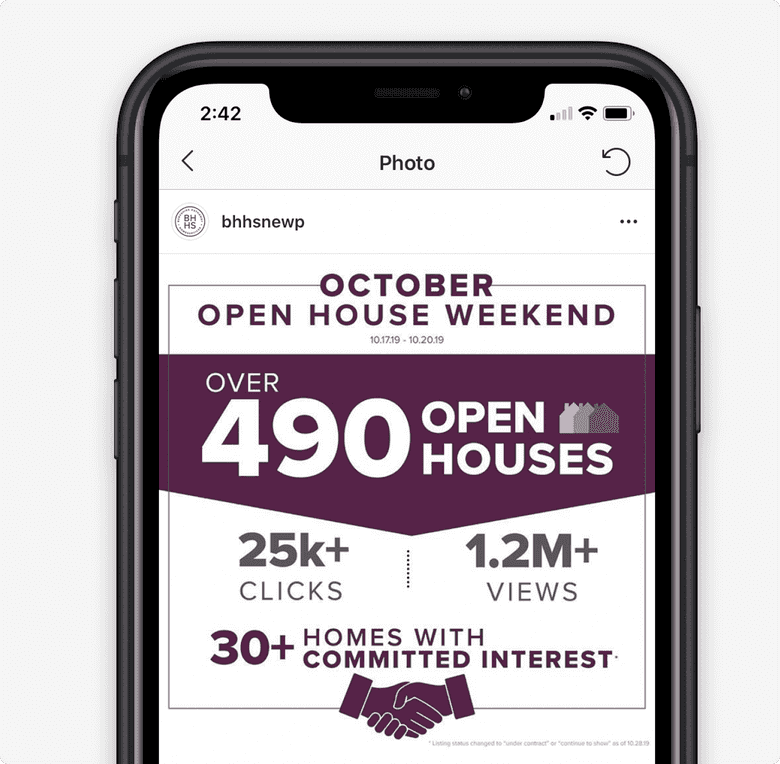
Use your results to plan for the future
Take time to celebrate your successes, but don’t forget to use these insights to drive future business initiatives.
If an office using an open house software seems to be performing above all the others, consider implementing the technology across all your sales offices. If you notice that a neighborhood’s opens and attendance have increased three-fold in the last year, consider recruitment campaigns or even adding a new office in the area. Consider using the contact information you collected to run targeted ad campaigns directed at in-market, active buyers. When you have robust business data, your optimization opportunities are truly endless.
See the results! Download this Case Study and learn how four top brands achieved success with their Mega Open House Events.